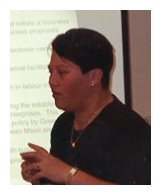
-
Voices
- Taskforce special meeting
- Photos from the Taskforce special meeting
- DEREK FOX
Mayor of Wairoa
 I agree with the Commissions that employment is the biggest difficulty that Maori are facing.
You cannot have such extraordinarily high levels of Maori unemployment continuing because it just
creates more disaffected people ... and it is all tied up with poor housing, poor health and all the other
negative indices.
I agree with the Commissions that employment is the biggest difficulty that Maori are facing.
You cannot have such extraordinarily high levels of Maori unemployment continuing because it just
creates more disaffected people ... and it is all tied up with poor housing, poor health and all the other
negative indices.
And the key is jobs. If people have jobs then they have the opportunity to participate in the economy.
I agree with the thrust that the Commission took which was that we need to have an overall New Zealand employment strategy ... because if we simply say we have a problem with Maori employment, then we will not have a wider ownership of the problem, and there will be minimalist programmes established to deal with it.
The figures that I wanted to draw the Mayors attention to were that 80% of the Maori population is under the age of 30 years. The mean average age of Maori is 22 years. This contrasts with the mean average age of non-Maori which is at 34 years.
Now that presents a problem for planners. If you are planning programmes which are aimed at a bulge that is 34 years old, then you are in trouble with Maori which has another bulge of younger people who are only 22 years old. These are the sorts of things that all central planners need to take into account. What this means is that if young Maori are unemployed now ... then that huge bulge of people have yet to come into the productive economy.
I think Mayors for Jobs is an extraordinarily positive group and you can see that there are people here who are keen to get to grips with this issue. I think it would have been very easy for us to descend into telling "war stories" about various projects we are involved in, but I think the strategic approach at this time is correct. We still have to roll up our sleeves and find the solutions now.
- JUNE McCABE
Former Chair of Maori Economic Development Commission
 The issues here are quite massive. It would seem to me that the solutions are all about small
steps, not quick fixes. There are a lot of incremental things that can be done and done together. We need
a spectrum of initiatives so that we move away from the idea that one solution has to fit all problems.
The issues here are quite massive. It would seem to me that the solutions are all about small
steps, not quick fixes. There are a lot of incremental things that can be done and done together. We need
a spectrum of initiatives so that we move away from the idea that one solution has to fit all problems.
For example, I think an important task will be bringing appropriate mentors into the Maori communities, aimed at those Maori who have the will and desire to change their circumstances ... but don't have the information, or don't know where to go to get it.
Maori have an asset base of about $10.6 billion, and, of this, about $6 billion is in land assets. The top area that Maori should be paying attention to is the area of tourism. But not tourism in the sense of people coming to look at attractions ... we need more of the sort of tourism that gives people a community or cultural experience.
The other area we need to look at is developing individual entrepreneurs and small businesses. In the past, Maori has focussed on large-scale industry — meat or forestry — where you are building a certain skills-set that is dependant on that work. We need to change that towards growing small business initiatives within the community, and this will require different skills. More small businesses will keep people interested in staying in the region and they don't migrate to the big city or overseas. The figures here are looking hopeful because the numbers of Maori in the self-employment figures are about 15%.
What I would be saying to Maori parents today is to support and encourage your children to look beyond the boundaries of what is there now. Encourage them to think of possibilities. Help them to want to do that through education, through accessing information and linking up with people who you know have been a success.
- RONGO WETERE
Former Chair of Maori Employment and Training Commission
 If we have 7% unemployment in New Zealand overall ... then this means virtually 20%
unemployment for Maori. These statistics are not really sustainable over the long term. The community needs
to address these statistics if we are to avoid absolute social disruption in the years ahead.
If we have 7% unemployment in New Zealand overall ... then this means virtually 20%
unemployment for Maori. These statistics are not really sustainable over the long term. The community needs
to address these statistics if we are to avoid absolute social disruption in the years ahead.
I regard Maori as being in a crisis situation in terms of the effects of benefit dependency and unemployment. This can be seen in that Maori, with only 15% of the population, are resulting in almost 40% of the abuse cases. And the results of a National Party survey show that one in two Maori males will have a serious conviction against their name by age 20 (... and not from traffic offences).
We believed, as a Commission, that it was ridiculous that New Zealand didn't have an employment strategy, and that it didn't have clear guidelines on how to achieve full employment in New Zealand. Full employment should be our commitment ... and if you don't plan for it, then you will never achieve it.
I'm delighted that the Mayors Taskforce for Jobs has taken up this challenge and set itself some goals for the year 2005. I believe that a united Mayors Taskforce will receive the full backing of Maoridom in endeavouring to address these issues. I think they will gain a lot of respect for their efforts as they take up the cudgels on employment and jobs.
We've got a job to get the bureaucrats and government on-side. But this shouldn't really be difficult given the political situation that currently exists — we now have as government that is prepared to attack the disparities gap.
- PROFESSOR IAN SHIRLEY
Massey University, who led a team developing a national employment strategy on behalf of the Maori Employment and Training Commission.
 New Zealand doesn't have an employment strategy and this is where we need to start.
Developing a strategy is quite different from producing a series of reports. We're talking about engaging
with people at the regions and at a local level so that we collectively identify the employment barriers and
we create a strategy for employment and economic development.
New Zealand doesn't have an employment strategy and this is where we need to start.
Developing a strategy is quite different from producing a series of reports. We're talking about engaging
with people at the regions and at a local level so that we collectively identify the employment barriers and
we create a strategy for employment and economic development.
When you start to look at this across the board, you start to recognise that issues like governance, for example, are fundamental to developing the regions. The physical infrastructure of the regions, the utilities available, the education and training systems ... all of these things come together to both improve the capacities of the workforce and the capacities of the region.
I think if you focus all your attention on Maori, then you end up focussing on them as victims. There was an anthropologist that used to ask: Why is it that we always focus down on captive populations ... and never focus up?
If we are going to have an understanding of what the true barriers and opportunities are for Maori in employment, then we have to take a broader perspective. We have to look at the governance structures, we've got to look at the capacities and competitive advantages of the regions. And then, within this, we can start to address the specific need of groups such as Maori.
Sources — Interviews with Vivian Hutchinson at the Mayors Taskforce for Jobs meeting with Maori Economic and Employment Commissions, Wellington 31 August 2000.

Top of Page
This Letter's Main Page
Stats | Subscribe | Index |
The Jobs Letter Home Page | The Website Home Page
jrt@jobsletter.org.nz
The Jobs Research Trust -- a not-for-profit Charitable Trust
constituted in 1994
We publish The Jobs Letter
Mayors, Maori and Employment
from The Jobs Letter No.130 / 8, September 2000
— from the Mayors Taskforce for Jobs special meeting with leaders of the former Maori Economic and Employment Commissions.








